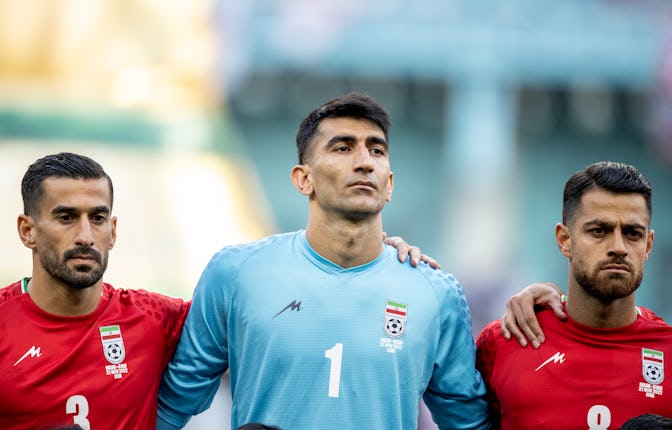Iran's national team boycotted their national anthem at the World Cup
The soccer players showed support for Iranian protesters following Mahsa Amini's death.

The World Cup is known for its enthusiastic displays of nationalism, bringing teams representing countries from around the world to compete in the quadrennial soccer competition. In short, it’s fun, a little more intense than your typical sporting event, and the topic of conversation for weeks on end. But this year’s Cup in Qatar flirts with peeling back the layers on what it truly means to be patriotic.
On Monday morning, Iran’s national team made a powerful statement preceding their game with England. While the Iranian National Anthem played before kick-off, the Iranian players lined up — but refrained from singing. Not only was the decision to remain silent a show of solidarity with ongoing protests in Iran — the most significant one stemming from the suspicious death of 22-year-old Mahsa Amini after being detained by Iran’s morality police — but it also proved to be a major one considering The World Cup is deemed “the most-watched sporting event on the planet,” according to CBS News. Ahead of this year’s launch, FIFA projected 5 billion people will tune in to catch the series of games. All eyes were on Iran.
During the Iran vs. England game, the chants and protests continued in and outside the stadium. Inside, fans including men, women, and children wore shirts with three impactful words: “Zan, Zindagi, Azadi” (“women, life, freedom”) in support of the months-long protests against the Khamenei Regime in Iran. Outside the stadium, protestors chanted “Iran” and waved banners with Amini’s face imprinted on them. “My people in Iran are under a lot of pressure and are being killed by the regime, so we want to use this opportunity to raise a voice for them,” Mahmoud Izadi, one of the protest organizers, told Al Jazeera.
And Iranian players aren't the only ones standing up for human rights during the 2022 World Cup. Before FIFA threatened to penalize players with yellow cards — two of which would mean a two-game suspension for the players in question — for allegedly defying Qatar on Monday, team captains had previously agreed to sport rainbow armbands. The planned armbands were widely seen as a protest of Qatar’s storied history with suppression as it relates to free speech, fair pay, and the criminalization of homosexuality.
We’re only a few days into the 2022 World Cup, but it’s already been a clear reminder that nationalism isn’t just about winning the tournament’s coveted gold trophy, but something much more compelling: It’s become a way to show the world that no matter how proud someone is of their cultural upbringing and home country, nothing trumps taking action to ensure present and future generations reap the rights and benefits they inherently deserve.